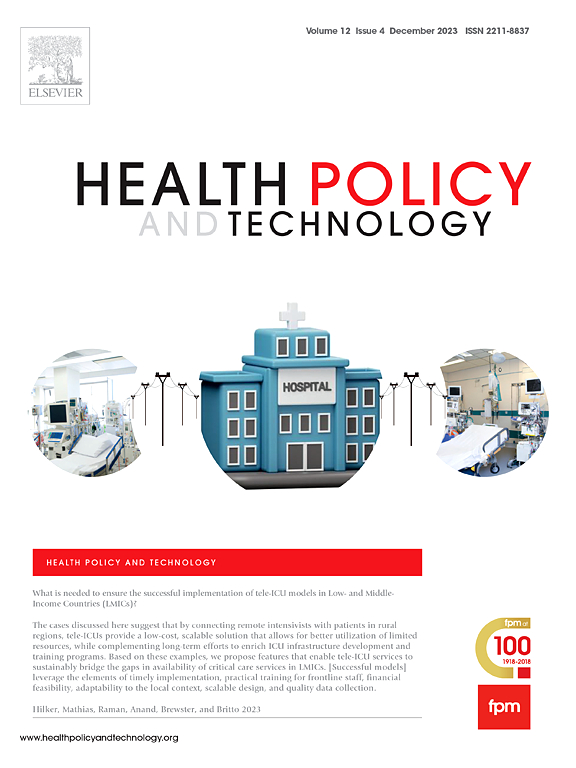加纳结核病治疗支持者的费用和心理负担
IF 3.7
3区 医学
Q1 HEALTH POLICY & SERVICES
引用次数: 0
摘要
目的结核病治疗支持者在没有经济补偿的情况下为结核病控制和预防做出了重要贡献。世界卫生组织建议直接观察治疗情况,涉及因经常前往卫生设施和等待时间而产生费用的支持者,这可能影响他们的社会经济地位。本研究旨在通过确定与治疗支持相关的费用和社会心理负担,为结核病控制和预防政策提供信息。方法采用横断面疾病成本法,通过有效问卷收集385名支持者的数据。评估了直接和间接成本,并使用Zarit负担访谈(ZBI) 12项问卷测量了心理社会负担。结果显示,支持者平均每月花费122.4 GHS(21.1美元),占其收入的19%。77.1%的人在ZBI量表上经历了高负担,女性比男性面临更大的负担。教育、家庭规模、收入和居住地区等社会人口因素对直接和间接成本都有影响。总之,该研究强调了结核病治疗支持者的巨大成本和心理社会负担,并建议扩大加纳的生计赋权减贫项目,以涵盖治疗支持成本。本文章由计算机程序翻译,如有差异,请以英文原文为准。
Costs and psychosocial burden of tuberculosis to the treatment supporters in Ghana
Objectives
Tuberculosis treatment supporters contribute crucially to tuberculosis control and prevention without financial compensation. The World Health Organization recommends direct observation of treatment, involving supporters who incurred costs for frequent health facility visits and waiting times, potentially impacting their socio-economic status. This study aims to inform tuberculosis control and prevention policy by determining the costs and psychosocial burden associated with treatment support.
Methods
A cross-sectional cost-of-illness approach, data from 385 supporters were collected through validated questionnaires. Both direct and indirect costs were assessed, with psychosocial burden measured using the Zarit Burden Interview (ZBI) 12-item questionnaire.
Results
Results reveal that, on average, supporters spent GHS 122.4 (US$21.1) monthly, constituting 19 % of their income. A significant 77.1 % experienced a high burden on the ZBI scale, with females facing a greater burden than males. Socio-demographic factors such as education, household size, income, and district of residence influenced both direct and indirect costs.
Conclusion
In conclusion, the study underscores the substantial costs and psychosocial burden on tuberculosis treatment supporters and recommends extending the livelihood empowerment against poverty program in Ghana to cover treatment support costs.
求助全文
通过发布文献求助,成功后即可免费获取论文全文。
去求助
来源期刊

Health Policy and Technology
Medicine-Health Policy
CiteScore
9.20
自引率
3.30%
发文量
78
审稿时长
88 days
期刊介绍:
Health Policy and Technology (HPT), is the official journal of the Fellowship of Postgraduate Medicine (FPM), a cross-disciplinary journal, which focuses on past, present and future health policy and the role of technology in clinical and non-clinical national and international health environments.
HPT provides a further excellent way for the FPM to continue to make important national and international contributions to development of policy and practice within medicine and related disciplines. The aim of HPT is to publish relevant, timely and accessible articles and commentaries to support policy-makers, health professionals, health technology providers, patient groups and academia interested in health policy and technology.
Topics covered by HPT will include:
- Health technology, including drug discovery, diagnostics, medicines, devices, therapeutic delivery and eHealth systems
- Cross-national comparisons on health policy using evidence-based approaches
- National studies on health policy to determine the outcomes of technology-driven initiatives
- Cross-border eHealth including health tourism
- The digital divide in mobility, access and affordability of healthcare
- Health technology assessment (HTA) methods and tools for evaluating the effectiveness of clinical and non-clinical health technologies
- Health and eHealth indicators and benchmarks (measure/metrics) for understanding the adoption and diffusion of health technologies
- Health and eHealth models and frameworks to support policy-makers and other stakeholders in decision-making
- Stakeholder engagement with health technologies (clinical and patient/citizen buy-in)
- Regulation and health economics
 求助内容:
求助内容: 应助结果提醒方式:
应助结果提醒方式:


